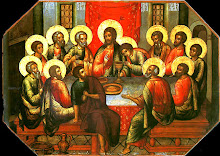 Too beautiful not to snatch from Father Z's blog: St. John Chrysostom on Holy Communion -
Too beautiful not to snatch from Father Z's blog: St. John Chrysostom on Holy Communion -Let us not, I beg you, slay ourselves by our irreverence, but with awe and purity draw near to it; and when you see it set before you, say to yourself: ‘Because of this Body am I no longer earth and ashes, no longer a prisoner, but free: because of this I hope for heaven, and to receive the good things therein, immortal life, the portion of angels, to converse with Christ’.








2 comments:
Dear Ath,
Let us not, I beg you, slay ourselves by our irreverence...
If we use a little Girardian anthropology here we see one of the major issues of violence that besets our world, at least the way I see it.
Definition of the word 'slay' -
1. to kill by violence.
2. to destroy; extinguish.
irreverence
the condition of not being reverenced, venerated, respected, etc.
Without the appropriate reverence in a vertical transcendence which provides us with appropriate horizontal reverence (Matt 22:37-39), we fall into scandal which leads to rivalry, hatred and to violence.
So this prayer of St. John Chrysostom is not some nice pious prayer; it actually warns us that if we do not give the reverence appropriate to This Body we will become ashes.
Thank you for this great quote.
One need not even resort to Girard. One can stay in the confines of Our Lord's parables. The Prodigal Son went off to a far country, and, while his Father could not stop him in his willful "irreverence", He could and did wait and search the road for the son's penitent return. And when the son did trudge back toward the farm, the Father did not hesitate to restore him to full sonship.
Much, of course, can be made of this parable in terms of mimetic theory, but it need not.
In the same way, St. John Chrysostom says we willfully stray into a "far country" and out of relationship with the Body, Blood, Soul, and Divinity of Our Lord to our mortal peril. Why keep ourselves from this ordinary yet extraordinary means of Grace?
Why indeed.
Post a Comment